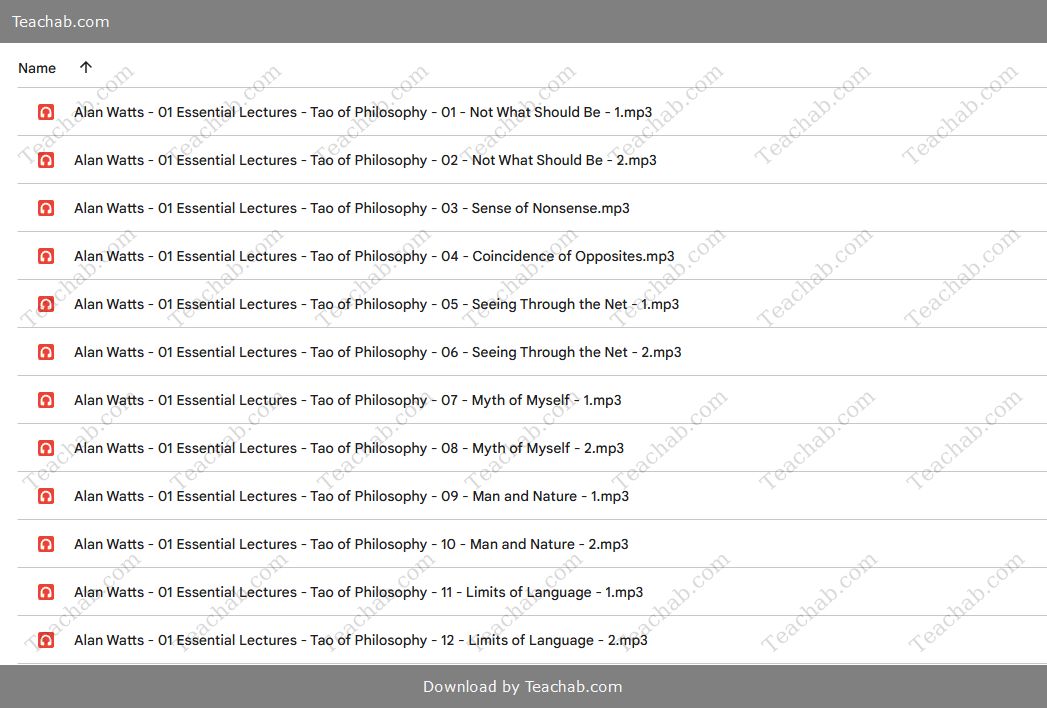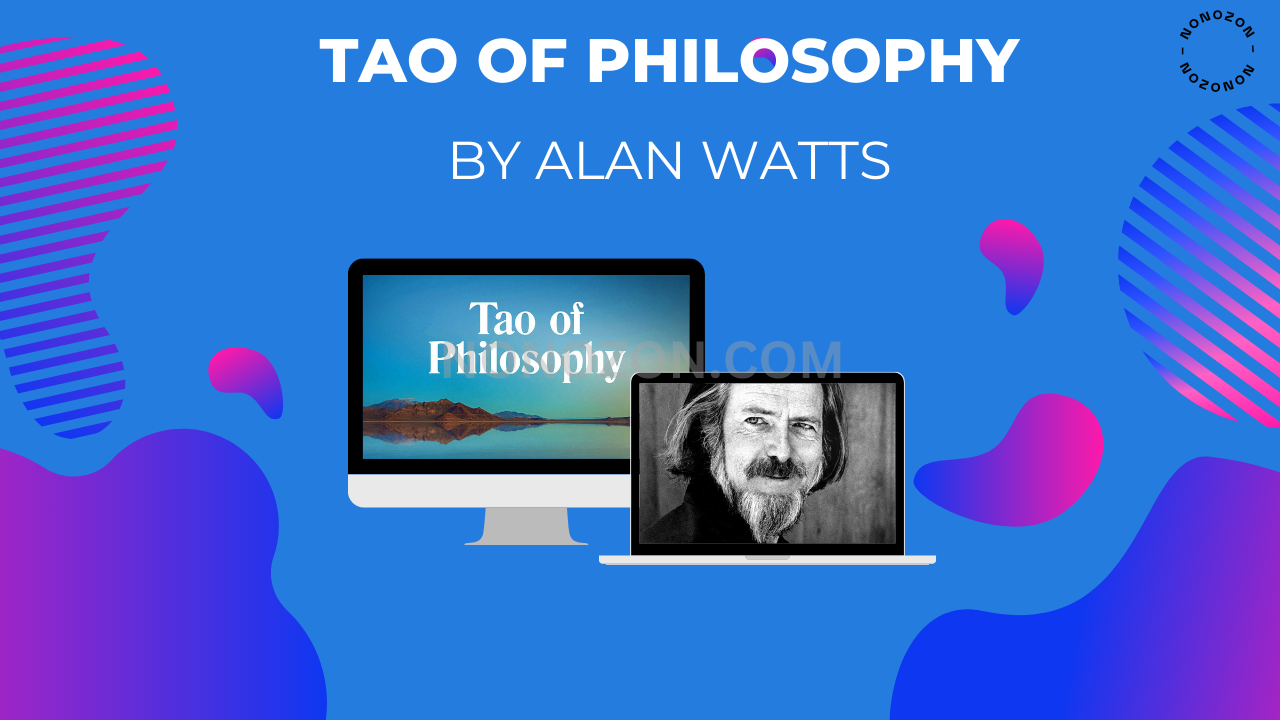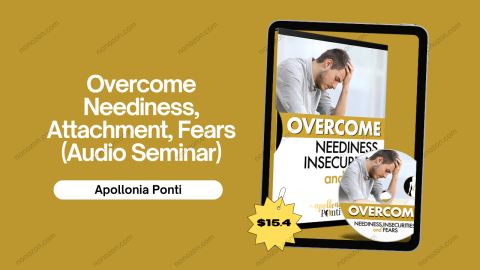Tao of Philosophy
by Alan Watts
Get Tao of Philosophy by Alan Watts Digital Download!
You can check proof of content here

Tao of Philosophy by Alan Watts
Overview

Exploring Taoism Through Alan Watts' Lens in The Tao of Philosophy
In The Tao of Philosophy, Alan Watts delivers an insightful journey into Taoist thought, skillfully contrasting it with foundational ideas from Western philosophy. Acting as a bridge between cultural paradigms, the book helps Western readers access Eastern views on existence, nature, and the human place within the cosmos. Watts, known for his clarity and philosophical accessibility, offers reflections that resonate beyond academic boundaries—inviting both casual seekers and seasoned thinkers into deeper contemplation.
At the heart of the book is a key Taoist principle: the wisdom of allowing life to unfold on its own terms, rather than attempting to direct every outcome. This approach stands in stark contrast to Western ideals that favor rational structure and control over spontaneity. Watts argues that by realigning ourselves with the natural world—and accepting our part within it—we nurture a more empathetic, balanced existence. He introduces the idea of being “human-hearted” as a way to describe this intuitive, compassionate mode of being that stems from surrendering rigid expectations.
Taoist Origins and Perspectives
Watts grounds his discussion in the early Taoist teachings of Lao-Tzu and Chuang-Tzu, whose philosophies emerged centuries before the Common Era. Rather than presenting Taoism as a system of fixed doctrines, he highlights its emphasis on lived experience over abstract theorizing. In this sense, Taoist thought diverges significantly from the Western habit of dissecting and categorizing human experience, opting instead for a direct, unmediated relationship with the Tao—the fundamental principle underlying all existence.
Wisdom from Ancient Voices
Lao-Tzu: Author of the Tao Te Ching, Lao-Tzu champions values such as humility, restraint, and inner peace as essential elements for aligning with the Tao.
Chuang-Tzu: Building on Lao-Tzu’s foundation, Chuang-Tzu emphasizes natural spontaneity and warns against the limitations of rigid logic and binary thinking, suggesting that life transcends static definitions.
Through these foundational perspectives, Watts illuminates how ancient ideas still apply to contemporary dilemmas, urging readers to internalize the Tao through firsthand experience rather than intellectual analysis.
Clarity Without Complexity
One of the book’s great strengths is Watts' accessible prose. He presents intricate ideas in a down-to-earth style that invites engagement rather than creating barriers. His informal, conversational tone contrasts sharply with much of traditional Western philosophy, which can feel overly analytical or exclusionary. Watts instead offers a refreshing alternative: a philosophical discussion that feels intimate, intuitive, and relevant.
This accessibility doesn’t compromise the book’s intellectual substance. Rather, it enables a deeper reflection by making philosophical exploration feel like a natural conversation, one that readers are likely to return to repeatedly as their understanding evolves.
A Meeting Point of Cultures
Watts also provides historical and cultural context, particularly the convergence of Eastern and Western spiritual traditions during the 1960s. He notes how many individuals during this era—especially those disillusioned with conventional religion—looked to Eastern philosophies for spiritual renewal. This cross-cultural exchange often resulted in hybrid beliefs, blending Taoist insight with more progressive Christian thought.
He also cautions against the superficial adoption of Eastern ideas. When misinterpreted or stripped of depth, these philosophies risk becoming empty trends rather than transformative practices. Watts urges readers to move beyond surface-level fascination and instead pursue meaningful, committed engagement.
Influence of the 1960s Cultural Landscape
A shift toward experimental spirituality and questioning of organized religion
Adoption of Taoist ideas within Western countercultural movements
A reminder from Watts to avoid oversimplifying or commodifying ancient wisdom
A Balanced Critique of Philosophical Traditions
Rather than championing one school of thought over another, Watts offers a nuanced critique of both Eastern and Western perspectives. He warns that shallow interpretations of any system—whether Taoist or rationalist—can lead to misunderstanding. In particular, he critiques the Western tendency to view the universe as a machine, where human mastery and intellectual control are paramount. This mechanistic worldview, Watts contends, fails to account for the unpredictability and subtle interdependence inherent in life.
By challenging rigid frameworks, he invites readers to adopt a more organic understanding of existence—one that embraces ambiguity, interconnectedness, and flow.
Comparing Eastern and Western Viewpoints
| Aspect | Taoist Philosophy (Eastern) | Western Philosophy |
|---|---|---|
| Nature of Reality | Emergent, interconnected, holistic | Mechanical, structured, controlled |
| Human Identity | Embedded in the natural world | Often viewed as separate from nature |
| Approach to Living | Embrace of spontaneity and surrender | Emphasis on logic and regulation |
| Spiritual Practice | Intuitive and experiential | Doctrinal and often rigid |
Watts doesn't pit one system against the other but rather highlights how examining these contrasts reveals each tradition’s strengths and limitations. The goal is not to choose one, but to integrate insights from both.
Living with Ambiguity and Depth
Ultimately, The Tao of Philosophy champions the idea that embracing uncertainty is essential to living well. This perspective appeals to those seeking alternatives to rigid moral systems and absolute answers. Watts’ interpretation of Taoism encourages readers to become more attuned to the present moment, more accepting of complexity, and more open to mystery.
Rather than offering a blueprint for life, the book opens space for exploration. It allows readers to reflect on their beliefs, let go of unnecessary constraints, and find peace in the very act of not knowing.
Final Reflections
In summary, The Tao of Philosophy is more than a primer on Eastern thought—it’s an invitation to reimagine our assumptions about life, control, and connection. Alan Watts presents Taoism as a living, breathing philosophy that continues to offer clarity and insight for a modern world overwhelmed by complexity and disconnection. Through poetic yet practical language, he encourages a return to harmony with nature, others, and ourselves.
Timeless in its themes and accessible in its style, this work remains an invaluable resource for anyone looking to explore alternative ways of thinking about the world—and their place within it.
Related products

Making Contact, Satir Process, Personal Workbook, Forgiving Parents PDF bundle
by Virginia Satir
$100.00
$38.50

Overcome Neediness, Attachment, Fears (Audio Seminar)
by Apollonia Ponti
$129.00
$15.40


